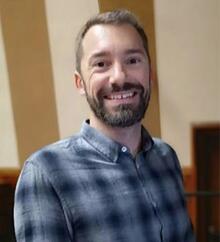Pierre Guillard is an associate Professor at Sorbonne University, and researcher at the Institut

Talk Title and Abstract:
Observations
and
modelling
of
signatures
of
the
dissipation
of
turbulence
driven
by
accretion,
merging
and
feedback
The
build-up
of
galaxies
is
regulated
by
a
complex
interplay
between
gravitational
collapse,
galaxy
merging
and
feedback
related
to
AGN
and
star
formation,
for
which
we
still
miss
a
robust
theory.
The
energy
released
by
these
processes
has
to
dissipate
for
gas
to
cool,
condense,
and
form
stars.
How
gas
cools
is
thus
a
key
to
understand
galaxy
formation
and
why
it
such
an
inefficient
process.
Spitzer
and
Herschel
infrared
spectroscopy
has
revealed
a
population
of
nearby
galaxies
with
weak
star
formation
and
unusually
bright
emission
lines
(e.g.
[CII],
molecular
hydrogen),
with
very
broad
linewidths.
The
line
luminosities
are
greatly
in
excess
of
that
expected
by
photoelectric
heating
of
the
gas,
suggesting
that
they
are
powered
by
the
dissipation
of
turbulent
kinetic
energy.
This
discovery
of
large
masses
of
gas
not
associated
with
star
formation
reveal
the
potentially
important,
but
largely
unexplored,
role
that
turbulence
plays
in
the
energetics
and
formation
of
multiphase
gas
on
galactic
scales.
In
this
seminar,
I
will
discuss
a
few
examples
where
turbulence
driven
by
gas
accretion,
feedback,
and
galaxy
interactions,
which
is
largely
ignored
in
models
of
galaxy
formation,
and
captured
in
current
simulations
only
over
a
limited
range
of
scales,
may
have
a
major
impact
on
galaxy
and
halos
properties.
Would you like to join this Zoom seminar? Please email Donna Hayes.
Host